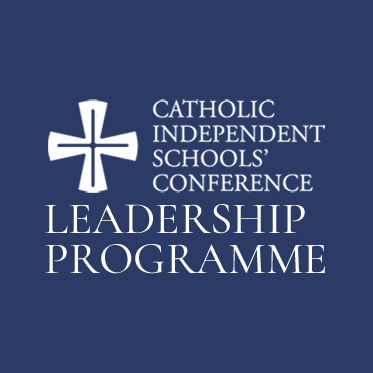
CISC Leadership Programmes
An Introduction to the Leadership of a Catholic School
Information for Heads and Applicants
Cohort B – 2017/18
Application Closing Date: 5.00pm on Friday 26 May 2017
Why is this programme important?
In the last few years, there has been a decrease in the numbers of people applying for headship in Catholic schools. At a time of rapid change in society, when more people answer ‘none’ to the question of religious affiliation, the definition of values is at the mercy of political rhetoric, and a small but influential lobby insists that there is no place for faith schools in a modern liberal democracy, it is of central importance that we are identifying, encouraging and training the next generation of leaders for our Catholic schools.
The reason for this is not ‘empire building’ but a commitment on our part to the mission of the Church, which is to make the good news of Jesus Christ known to all people and to build up the Kingdom of God which He proclaimed. The most recent document from the Congregation for Catholic Education, Educating Today and Tomorrow: A Renewing Passion, provides a very honest analysis of the state of Church practice among young people and the critical role of Catholic schools. It acknowledges, perhaps for the first time, that “Catholic schools are often the only places where young people encounter the bearers of Good News.”
This means that those who lead our schools need to be faith leaders first and foremost. The same document declares that, “If we want to avert a gradual impoverishment, Catholic schools must be run by individuals and teams who are inspired by the Gospel, who have been formed in Christian pedagogy, in tune with Catholic schools’ educational project, and not by people who are prone to being seduced by fashionability.” The purpose of this course is to take up that challenge and inspire the next generation of Catholic leaders, to deepen their commitment to the Gospel and the formation of our young people.
Who is this course suitable for?
This course is designed for senior leaders in Catholic schools who have been identified by their heads as having either the potential to lead a Catholic school, or who would like to deepen their understanding of being a leader in a Catholic school. Senior leaders can include middle leaders, but the course would not be suitable for those with little experience of leadership and management. All applications should be supported by a head’s reference. Applicants do not have to be Catholic.
What is unique about this course?
Many dioceses will run their own versions of aspiring heads courses, but the CISC course is the only programme run for Catholic independent school leaders. While the mission of the Catholic school is the same throughout the world, there are particular challenges and opportunities in the independent sector. The programme will have its own chaplain who will attend each residential conference and provide informal support and guidance for delegates. The programme will include a 24-hour retreat retreat to help delegates deepen their own faith and their understanding of the spiritual dimension of Catholic leadership and to ‘signpost’ guided retreats. Places will be limited (to around 12) in order to create a supported seminar-style learning environment which will most benefit delegates and to provide 1:1 mentoring for each delegate.
What are the aims of this course?
- By the end of the course it is anticipated that delegates will have gained:
- A deeper understanding of their own strengths and areas for development as future Catholic leaders in education
- A deeper understanding of the Gospel and their own call to service
- A deeper understanding and appreciation of the mission of the Catholic school
- More confidence in being able to articulate their understanding of the mission of a Catholic school
- More understanding of the range of Catholic schools through visits
- More confidence to play a leading role in the mission of their current school
- More confidence to apply for leadership posts in Catholic education
How is the course taught and assessed?
There will be a variety of teaching and assessment methods used throughout the course, including:
- National keynote speakers
- Presentations from serving heads
- Online self-evaluation tool
- Group discussion, interactive group tasks
- Consideration of ‘key questions’ throughout
- Peer-assessed delegate presentations
- 1:1 developmental work with a mentor
- Written essays
- Text books
- Conference workbook with reflection opportunities
- Email update and think pieces
- School-based leadership projects and action research
Delegates will have the option in 2017/18 to either submit a 2,500-word essay on “My Understanding of the Mission of a Catholic School” (this is required for those who wish to receive credits for a Masters) or prepare an 8-10 minute PowerPoint presentation to be peer-assessed at the June 2018 conference.
In the course of 2018/19 delegates will be expected to lead on a whole school aspect of Catholic mission in their own schools and undertake action research to determine its impact. Those who wish to receive credits for a Masters course in Catholic leadership will be required to submit their action research findings in a 2,500-word essay, other delegates will be expected to present their work in an 8-10 minute PowerPoint presentation to the staff, governors, or senior leadership in their own schools. The essays will be assessed by the course tutor, Raymond Friel, against the Framework for Higher Education (FHEQ) Level 7, and moderated by the Catholic universities.
Will the course be recognised by Catholic schools?
On completion of the course, delegates will receive a Certificate of Completion signed by the Chair and General Secretary of the Catholic Independent Schools’ Conference. CISC is well known and well regarded by Catholic independent schools in the UK and beyond. Increasingly, CISC has a high profile in the wider Catholic educational community and in the national education community. A Certificate of completion for this course will have ‘currency’ and will be recognised by Catholic schools as a quality mark in any candidate’s CV.
How does the mentoring process work?
A key feature of the programme is that each delegate will be allocated a mentor. Delegates will be divided into study groups of around three, each with the same mentor. The intention is that a study group will visit their mentor’s school (preferably on the same day) and enjoy a tour of the school, conversations with senior leaders and pupils and 1:1 time with their mentor. There will be two meetings with the mentor in between the residential conferences. It is the intention that the mentor attends both residential conferences. The mentor will:
- Offer an opportunity for reflection and action, working closely with delegates on their development as Catholic school leaders
- Have an overview of the delegate’s progress through the course and into the second year
- Signpost other activities, visits or activities which may be beneficial
- Offer confidentiality and a ‘safe space’ for candid developmental conversations
What will the programme cover over 2017/18?
July 2017: Key documents and link to online self-evaluation emailed to delegates for preparatory guided reading and reflection
12 & 13 Oct: Residential No.1: SELF AND MISSION (Oatlands Park, Surrey)
Delegates will explore their own faith journey, values and strengths – Gospel values – discernment in the Christian tradition – The mission of the Catholic school – key principles from Church documents and experience of practitioners – reflections on themselves as potential leaders
Nov-Dec: Visit to mentor’s school
Delegates will reflect with their mentor on what they have learned so far – their professional development needs – different leadership styles and journeys – the mentor’s school and its context
Jan-Mar: School visit to a different educational setting or one of the CISC special schools
Delegates will explore how the mission of the Catholic school is expressed in different settings and which type of setting they might be best suited for as a leader.
March: 24-hour retreat (Fri-Sat, dates to be confirmed)
Delegates will have the opportunity for prayer and reflection, seeing leadership in the context of the Gospels, deepening their own faith and developing an understanding of themselves as faith leaders, they will be introduced to Schools of Prayer and signposted to individual guided retreats as a further option
Apr-May: Second Meeting with Mentor (in mentor’s school or elsewhere by arrangement)
Delegates will reflect further with their mentor on what they have learned in the course of the programme – their professional development needs – different leadership styles and journeys, emotional intelligence – possible next steps on the journey of leadership
May: 2,500 word essay on “My Understanding of the Mission of a Catholic School” submitted to course tutor (unless PowerPoint option is chosen)
7 & 8 June: Residential No.2: SELF AND LEADERSHIP (venue to be confirmed)
Delegates will explore what the leadership of a Catholic school involves with help from practitioners and interactive sessions – peer assessment of delegate presentations – what they have learned about the mission of a Catholic school and their potential to be a leader – next steps in the journey
July 2018: Next steps, formation of an action plan for the future, including the topic for school-based action research in 2018/19 culminating in a 2,500-word essay or an 8-10 minute PowerPoint presentation to staff, governors, or senior team in delegate’s school.
What key questions will be explored in the programme?
Apart from the key questions covered in the aims of the programme, delegates are encouraged to deepen their learning experience in collaboration with others by engaging with some of the following questions:
- What is human flourishing?
- Is the mission of the Catholic school radical or reactionary?
- How would I market a Catholic school with integrity?
- What would a ‘Catholic curriculum’ look like?
- What does it mean in practice to promote the common good?
- How can we develop the spirituality of our staff?
- Do I have to defend the indefensible?
- What if I have doubts?
- What will I ‘lose’ if I take on Catholic headship?
- What does being a public faith leader in the community involve?
- Where and how am I nourished?
What key texts would it be useful to read?
There has been a steady stream of documents from the Congregation for Catholic Education since the Second Vatican Council and an increasing body of research-based publications from Catholic academics. From this list, key texts will be signposted:
Vatican Documents
- Gravissimum Educationis, Vatican II’s Declaration on Christian Education (1965)
- The Catholic School, (The Sacred Congregation for Catholic Education, 1977)
- Canon Law (1983) – Canons 793-821
- The Catholic School on the Threshold of the Third Millennium, (Congregation for Catholic Education,1997)
- Lay Catholics in Schools: Witnesses to Faith (CfCE,1982)
- Educating in Intercultural Dialogue in Catholic Schools: Living in Harmony for a Civilization of Love (CfCE, 2013)
- Educating Today and Tomorrow: A Renewing Passion (CfCE, 2014)
These are easily available by entering the title into any search engine. You’ll be taken to the document on the Vatican website: www.vatican.va
Documents from the Bishops of England and Wales
The Common Good, Bishops Conference of England and Wales (1996)
This can be found at http://www.cbcew.org.uk/CBCEW-Home/Publications/(offset)/40
Christ at the Centre, Bishop Marcus Stock (Revised Edition, 2012)
This can be found on the CES website at www.catholiceducation.org.uk from the About>Publications tab
Catholic Education in England and Wales (Bishops’ Conference of England and Wales, 2014)
This can be found on the homepage of the CES at www.catholiceducation.org.uk
Catholic Education
- Raymond Friel, Gospel Values for Catholic Schools: A Practical Guide for Today (2017)
- Jim Gallagher, Celebration and Challenge (2015)
- Gerald Grace, Catholic Schools: Mission, Market and Morality (2002)
- Nicholas King, The Helplessness of God: Biblical Models of Leadership (2014)
- Dermot A. Lane, Catholic Education in the Light of Vatican II and Laudato Si’ (2015)
- Archbishop J. Michael Miller, The Holy See’s Teaching on Catholic Schools (2006)
- John Sullivan, Catholic Schools in Contention (2000)
Spiritual Development
- Robert Baron, Catholicism (2011)
- Enzo Bianchi, Why Pray, How to Pray (2014)
- Walter Breuggemann, Sabbath as Resistance (2014)
- Joan Chittister, In God’s Holy Light (2015)
- Raymond Friel, The Revolution of Tenderness: Being a Catholic in Today’s Church (2016)
- Thomas Keating, Open Mind, Open Heart (2007)
- James Martin, Jesus: A Pilgrimage (2014)
- Denis McBride, The Parables of Jesus (1999)
- Henri Nouwen, In the Name of Jesus (1989)
- John O’Donohue, Benedictus: A Book of Blessings (2007)
- Timothy Radcliffe, What’s the Point of Being a Christian? (2005)
- Richard Rohr, Things Hidden: Scripture as Spirituality (2008)
- Jean Vanier, Community and Growth (1979)
How much does it cost?
The total cost of the programme for each delegate is £950. This can be paid by the delegate’s school in two instalments over two financial years. A first payment of £550 is due before the end of September 2017. A second payment of £400 is due at the end of April 2018. Any head who can identify a suitable delegate for the programme but who cannot meet the full cost is welcome to have a confidential conversation about bursary support from CISC.
What are the benefits?
Any delegate who completes the course will have a much stronger and deeper understanding of the Catholic mission in education and will hopefully be inspired on the path to Catholic headship, which is a benefit to the wider Catholic community at a time of a shortage of suitable candidates for Catholic headship. This deeper understanding will increase the spiritual capacity of the delegate’s current school as will their whole school lead on an aspect of Catholic mission and the action research they will undertake in the second year.
Application Form – Introduction to Leadership Cohort B
Please complete and return the application form below to raymondfriel@cisc.uk.net before 5.00pm on Friday 26 May 2017
Payment
Please arrange payment of the first instalment of £500 before the end of September 2017 and the second instalment of £450 before the end of April 2018 (schools can pay the full amount if they wish) by BACS to the CISC HSBC account:
- Sort code 40 18 17
- Account Number 64019113
- transfer to be labelled “G512 CISC Leadership Programme 1718”
or, if this is not possible, post this form with a cheque payable to Catholic Independent Schools’ Conference, to 17 Rossiters Hill, Frome, Somerset, BA11 4AL.
Places on the programme will be confirmed by Friday 23 June 2017.
If you have any questions about the application process, please do not hesitate to contact me at raymondfriel@cisc.uk.net or on 07949 394925
Hourly Schedule
Day 1
- 5:00 pm -
- Closing Date and Time
- All applications to be in by 5.00pm on Friday 26 May 2017


